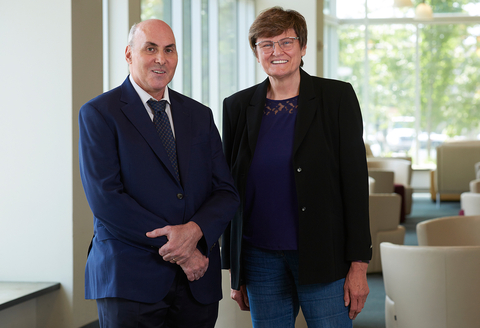
MANHASSET, N.Y.– The Feinstein Institutes for Medical Research has selected two scientists from the University of Pennsylvania Perelman School of Medicine, Katalin Karikó, PhD, and Drew Weissman, MD, PhD, as awardees of the ninth annual Ross Prize in Molecular Medicine for their tireless research in messenger RNA (mRNA) technology and contributions to developing mRNA-based vaccines to prevent the coronavirus disease 2019 (COVID-19).
The Ross Prize is awarded annually through the Feinstein Institutes’ peer-reviewed, open-access journal, Molecular Medicine. Two awardees were selected after the pandemic-related cancelation of the 2021 prize. The Prize includes a $50,000 award for each recipient and will be presented on June 7 with the New York Academy of Sciences (NYAS) at Cure on 345 Park Avenue South in Manhattan. It will take place as part of a half-day research symposium.
“Development of the mRNA vaccines for COVID-19 brought to light the decades-long scientific process and power of medical research,” said Dr. Karikó, adjunct professor of Neurosurgery at Penn and a senior vice president at BioNTech. “Through the support of the Ross Prize I am eager to continue our mRNA research to advance the technology even further.”
The duo is heralded for inventing the mRNA technology used in Pfizer-BioNTech and Moderna’s vaccines to prevent COVID-19 infection. For more than two decades, Drs. Karikó and Weissman studied mRNA to understand how to harness gene information and create new, more effective vaccines. Tapping mRNA technology has unlocked genes to create a blueprint for making proteins that help the body to function. The pandemic has illuminated its vast potential for an array of medical breakthroughs.
In the United States, two of the three vaccines approved are mRNA based. Drs. Karikó and Weissman’s early mRNA discoveries have laid the foundation for swift vaccine development – Pfizer-BioNTech designed its coronavirus vaccine in a matter of hours with Moderna quickly to follow. More than a billion COVID-19 mRNA vaccines have been administered to date worldwide.
“It has been a privilege to work alongside Dr. Karikó, with a culminating honor to see our years of research improve global health,” said Dr. Weissman, the Roberts Family Professor of Vaccine Research in Penn’s Perelman School of Medicine. “We hope to continue our work and inspire others to propel medical research forward and develop needed vaccines and therapies.”
After a brief award presentation, Drs. Karikó and Weissman will discuss their research in a symposium during which Florian Krammer, PhD and Peter Palese, PhD, from the Icahn School of Medicine at Mount Sinai and Laura Landweber, PhD, from Columbia University Medical Center, will discuss their research in infectious disease, the future of mRNA technology and genomics.
“Drs. Karikó and Weissman’s pursuit of mRNA technology revolutionized our development of vaccines and saved many lives from COVID-19. It is also fitting that we are celebrating in-person the two scientists whose research enabled our ability to get back together again,” said Kevin J. Tracey, MD, president and CEO of the Feinstein Institutes and editor emeritus of Molecular Medicine. “Their tireless research of mRNA allowed us to act quickly amidst a global pandemic and will be built upon for future vaccines in generations to come.”
Past recipients of the Ross Prize are: Adrian R. Krainer, PhD, Cold Spring Harbor Laboratory Professor; Daniel Kastner, MD, PhD, the National Institutes of Health’s (NIH) National Human Genome Research Institute (NHGRI) scientific director; Huda Y. Zoghbi, MD, professor, Departments of Pediatrics, Molecular and Human Genetics, Neurology and Neuroscience at Baylor College of Medicine; Jeffrey V. Ravetch, MD, PhD, the Theresa and Eugene M. Lang Professor and head of the Leonard Wagner Laboratory of Molecular Genetics and Immunology at The Rockefeller University; Charles N. Serhan, PhD, DSc, director of the Center for Experimental Therapeutics and Reperfusion Injury at Brigham and Women’s Hospital, the Simon Gelman Professor of Anaesthesia at Harvard Medical School and professor at Harvard School of Dental Medicine; Lewis C. Cantley, PhD, the Meyer Director of the Sandra and Edward Meyer Cancer Center at Weill Cornell Medical College and New York-Presbyterian Hospital; John J. O’Shea, MD, scientific director at the National Institute of Arthritis and Musculoskeletal and Skin Diseases (NIAMS); and Dan R. Littman, MD, PhD, the Helen L. and Martin S. Kimmel Professor of Molecular Immunology in the Skirball Institute of Biomolecular Medicine at New York University School of Medicine.

